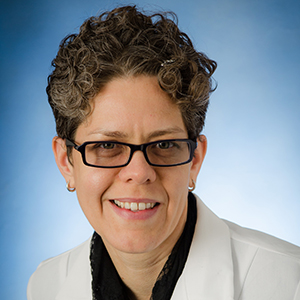Attention-Deficit/Hyperactivity Disorder (ADHD) affects around 5 percent of the world’s population. But despite its prevalence, it is still a widely misunderstood condition.
“You can’t have ADHD if you’re not hyper.”
“But you’re a successful adult, how can you have just been diagnosed with ADHD?”

These are just a couple of the common misconceptions about Attention-Deficit/Hyperactivity Disorder (ADHD). It’s a complex condition with varying symptoms that morph and persist throughout adulthood.
Look insideKP Northern California sat down with Evelyn Miccio, PsyD, a neuropsychologist at the Kaiser Permanente San Francisco Medical Center, to learn more about the condition.
What is ADHD?
ADHD is a neurocognitive disorder that can create challenges interpersonally, personally, and professionally. It impacts individuals across their lifespan and often hinders their full potential. While we don’t know what causes it, it is found to have a strong genetic component — associated with 75 percent of cases.
What is the difference between ADD and ADHD?
For many years, ADD was the acronym commonly used to describe Attention Deficit Disorder without hyperactivity. However, ADHD is now the official medical abbreviation, whether the individual is hyperactive or not. There are 3 main types of ADHD: inattentive type, hyperactive-impulsive type, or combination type.
Typically, the “H” is removed with adults. Instead of being disruptive, as they might have been as kids, they replace it with things such as foot tapping or playing with jewelry.
What are the symptoms?
The Diagnostic and Statistical Manual of Mental Disorders, 5th Edition (DSM-5) lists 18 symptoms to describe ADHD, with 9 inattentive presentations, such as not seeming to listen when spoken to directly, or 9 hyperactive presentations, such as running around as if “driven by a motor.” However, this is simply a checklist, and does not capture the social, medical, nutritional, and sleep challenges that can result.
How is it diagnosed?
Through a diagnostic clinical interview with a mental health professional, utilizing historical data, or a collateral informant, such as report cards, that may demonstrate a pattern of behavior. In childhood, or by 12 years of age, symptoms are usually apparent, due to challenges in school or with interpersonal relationships.
However, if someone is bright, charming, or well-insulated in a family environment where a parent helps to compensate, it may not become apparent until later in life. Sometimes ADHD is first diagnosed in college, or maybe after a divorce, when life’s demands exceed one’s compensatory strategies.
How is it treated?
ADHD is best approached by treating the most challenging symptoms for that individual.
Many symptoms of ADHD, like disorganization and low self-esteem, are best targeted from a Cognitive Behavioral Therapy (CBT) approach, arranged by a referral from a general practitioner. If one were to only take stimulants, they’d likely say, “I can focus.” But they wouldn’t necessarily know how to prioritize tasks or feel better about themselves.
I created an easy acronym for individuals with ADHD, with research-proven coping strategies and interventions, called “L.E.S.S.O.N.”
- Less screen, more green
- Exercise
- Sleep
- Socialize
- Organize
- Nutrition
What are the risks if ADHD is not properly treated?
ADHD has a high correlation with suicidal ideation and behaviors, as well as obesity, driving impairment, such as speeding and car accidents, head injuries, substance abuse, unexpected or unplanned pregnancies, STDs, and low self-esteem.
One can also feel extreme fatigue, as coping with undiagnosed ADHD can be exhausting, demoralizing, depressing, and anxiety-provoking. Many people with ADHD also face employment challenges.
What are some positive qualities associated with ADHD?
Individuals with ADHD can be quite talented, resilient, comical, resourceful, artistic, insightful, and emotionally sensitive beings. The good news is that change can be quite rapid once an individual has identified this or her core challenges and begins to implement interventions such as CBT or “L.E.S.S.O.N.S.”
It’s important to remember that many individuals with ADHD have wonderful attributes despite the constellation of challenges. They are individuals who not only think outside of the box, but create new ones!
Learn more about ADHD or sign up for a free adult ADHD class offering key coping strategies at Kaiser Permanente San Francisco.





This Post Has 10 Comments
Thank you very much for this article. I am one of the 5 percent and have to work on my areas of challenge every day. I don’t hesitate to share my diagnosis in hopes that it helps others understand and also, I have asked a few specific people in my life to help me identify and change behavior that I know is challenging for others to tolerate because I don’t realize I’m doing it until after the fact and can’t seem to get ahead of it. I feel that this has not only helped me, but helped with understanding and working with me on many aspects of my work and personal life. I look back and wonder how life would have been different if my ADHD diagnosis happened much earlier in my life, but you know what – that is all water under the bridge and I’m happy with who I am and have become. ADHD is part of that and I wouldn’t be who I am if my path was different.
Most modern medical practices are now putting a holistically trained nutritionist on staff. There is no denying that a poor diet results in poor health.
Read ‘Life Changing Foods’ by health guru and NY Times best-selling author Anthony William.
L.E.S.S.O.N. could be well utilized by our entire society. We would all be physically and mentally healthier!
I am wondering what specific research you have on diet and ADHD as diet has been a controversial topic with ADHD. I understand that when addressing diet for an individual, the best approach is to speak to an individual’s doctor.
Here is Dr. Miccio’s response to your question:
Thank you for your email. I would recommend seeking consultation with a nutritionist who is familiar with your medical background to offer specific dietary modifications, but in short, there is no panacea with regard to foods and ADHD (N. Sinn, 2008, article offers a nice overview, https://www.ncbi.nlm.nih.gov/pubmed/18826452).
There have been documented cases of ADHD and thyroid disturbances, as well as food sensitivities, environmental allergies, and low levels of vitamins B2, B6, B9, correlating with symptom severity (Stevens, L., et al., December 10, 2010).
Dr. Julia Rucklidge et al. (2011), has studied micronutrient interventions with some success after an 8 week period, but the actual ingredients and dosages of the “micronutrients” were not revealed.
Omega-3s have also been known to reduce aggression in adult ADHD, and improve cognitive functions (Meyer, B., et al., 2015).
There is also something referred to as the “Dopamine Diet” which is thought to increase dopamine (ADHD is known to have a dopamine deficit), with foods such as dairy, unprocessed meats, Omega-3 rich foods, eggs, fruits, specifically, bananas, nuts and dark chocolate, to improve overall functioning.
Wow! So concise and well presented; I read the whole thing 😉 We need more dissemination like this. Thank you for this article. It clears up so many misunderstandings.
Dr., my son has ADHD and I decided to not give him medication because the side effects were to much for him. What do you think about that?
Is there a special diet that would help him?
Thanks for writing in. Here is Dr. Miccio’s reply:
I recommend consulting with your son’s pediatrician and perhaps a nutritionist, in an effort to tailor his diet to his particular developmental needs.
I really appreciate this article. I was surprised when one of my adult sons who is in the military was diagnosed with ADHD. I’ve seen the impact of poorly treated ADHD play out in his life. I plan to share L.E.S.S.O.N. with him and the rest of the family as it will help all of us. Thank you!
I read the article and was quite enlightened; I identified with several key points. Well done Dr. Evelyn Miccio.